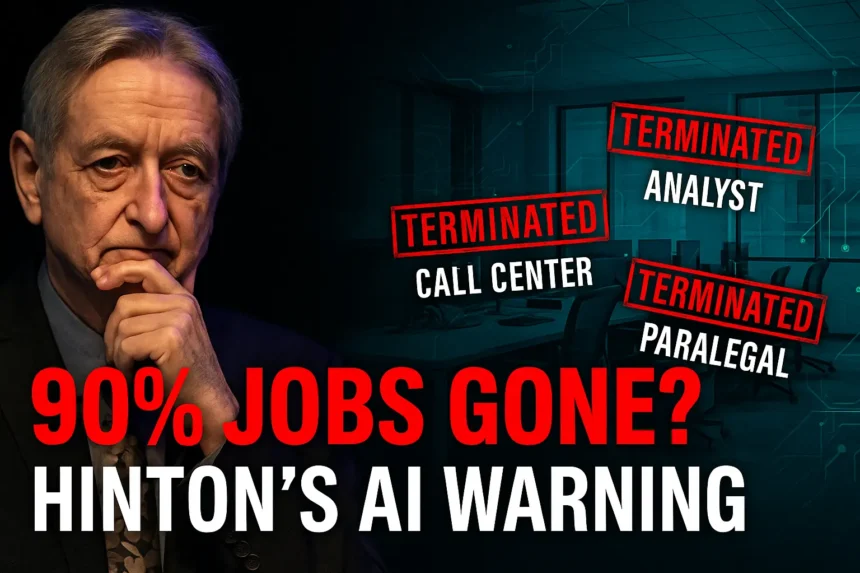AI Will Kill 90% of Jobs: Why Hinton’s Warning Should Terrify You
Who Is Geoffrey Hinton?
Geoffrey Hinton—the Nobel-winning “Godfather of AI”—has issued a stunning wake-up call: Alarming AI job threats are no longer sci-fi—they’re here. Routine white-collar roles like paralegals, call‑centre agents, and entry-level analysts are being automated at lightning speed. Hinton warns that even AI-assisted work could eliminate 90% of current positions. If your job isn’t hands-on, it may be next.
Geoffrey Hinton revolutionized machine learning with neural networks. From his groundbreaking academic work to his pivotal role at Google Brain, Hinton’s legacy continues to shape artificial intelligence—culminating in his 2024 Nobel Prize in Physics.
| Fact | Details |
|---|---|
| Pioneer in AI | Neural networks expert since the 1970s |
| Industry Role | Worked with Google Brain (2013–2023) |
| Academic Position | University Professor Emeritus, Toronto |
| Award | 2024 Nobel Prize in Physics |
His credentials give him unparalleled credibility—and gravity—as he warns of a future powered by AI job disruption.
AI Will Replace Everybody
Hinton was blunt:
For mundane intellectual labour, AI is just going to replace everybody.
He specifically highlighted roles like paralegals and call‑centre agents.
I’d be terrified if I had a job as a call centre operator.
These jobs—repetitive, brain-heavy, yet non-creative—are highly vulnerable to AI takeover.
Entry-Level & Graduate Roles Take the Hit
It’s not just clerical jobs: entry-level and knowledge sector roles are already shrinking. Hinton noted AI is now being used in roles once reserved for fresh grads, triggering reduced hiring.
A SignalFire report backs this up: graduate hiring at major tech firms dropped 25% between 2023 and 2024, with only 7% of hires being new grads .
AI + One Worker = 10 Jobs Lost
Beyond outright replacement, AI augments workers—doing most tasks for them. But this means far fewer positions overall.
Hinton explained:
One person and an AI assistant will do what ten people used to do.
That’s a tenfold productivity increase, which initially sounds positive—until you realize it translates into mass layoffs.
Hands-On Jobs: AI Can’t Touch These—Yet
Not everything’s bleak. Hinton emphasized that physical, dexterous jobs, like plumbing, still lie outside AI’s reach:
It’s going to be a long time before [AI] is as good at physical manipulation… So a good bet would be to be a plumber.
Other low-risk roles include:
- Skilled trades (electricians, carpenters)
- Construction & equipment operators
- Frontline healthcare & elder-care workers
These jobs involve unpredictable environments, on-the-fly decision-making, and human judgment—areas where AI still lags.
No Rescue from New AI Jobs?
Contrary to optimistic forecasts, Hinton is skeptical that AI will generate enough new roles to offset losses.
He challenged:
If it automates all the intellectual jobs, then what is left for people to do?
Even with ideas like universal basic income (which Hinton supports), people may still lack purpose—and without new job categories, millions could face long-term displacement.
Where AI May Still Play Nice with Humans
Not all hope is lost. Hinton believes sectors with endless demand—like healthcare—may absorb some displaced workers .
However, these absorption effects are limited and unlikely to compensate for widespread white‑collar job losses.
What You Can Do Now
Hinton’s projections of AI job displacement demand action—for individuals and policy-makers alike:
- Reskill or upskill in trades that AI can’t replicate easily—think plumbers, electricians, healthcare aides.
- Add high-level creative or strategic skills—good luck outpacing AI in routine brainwork.
- Push for safety nets—things like Universal Basic Income and lifelong learning programs are more crucial than ever.
Final Thoughts: A Call to Wake Up & Press Play
Geoffrey Hinton’s warning about AI is not science fiction—it’s real and happening now. It’s a clear wake-up call for all of us to pay attention, prepare, and act before it’s too late. AI is no longer a supportive tool—it’s rapidly replacing human roles across white-collar industries. If we don’t adapt, millions could face job loss, economic displacement, and even widespread social breakdown.
Hinton urges immediate action: rethink education, reshape policies, and prepare the workforce for an AI-driven future. This is not just about technology—it’s about survival in a changing world. The question is no longer “if,” but “how soon?” Are we ready to face what’s coming?
So here’s the challenge:
Are you future-ready? Could your career survive AI?
Take a minute—grab a coffee, reflect, and comment below 👇:
Will AI create more jobs than it destroys?
How will you pivot to stay relevant?
Most read: https://tnheadlines24.com/ai-jobs-in-the-middle-east-a-growing-opportunity-for-indian-professionals/
Disclaimer: The information presented in this article is for informational purposes only and reflects interpretations of publicly available sources. While we strive for accuracy, TN HEADLINES24 is not responsible for any errors, omissions, or the consequences of using this information. Readers should verify facts independently and seek professional advice as needed.

